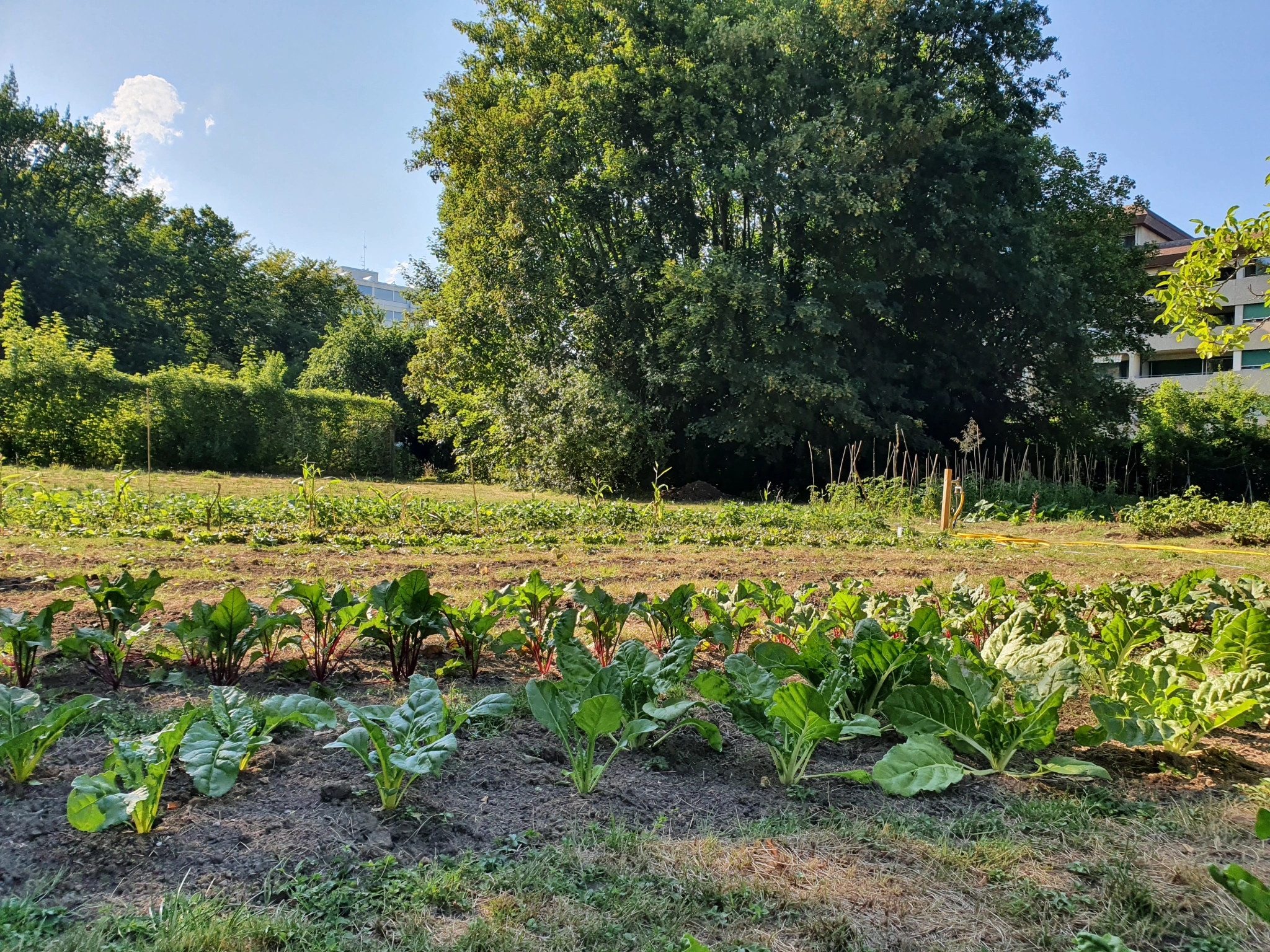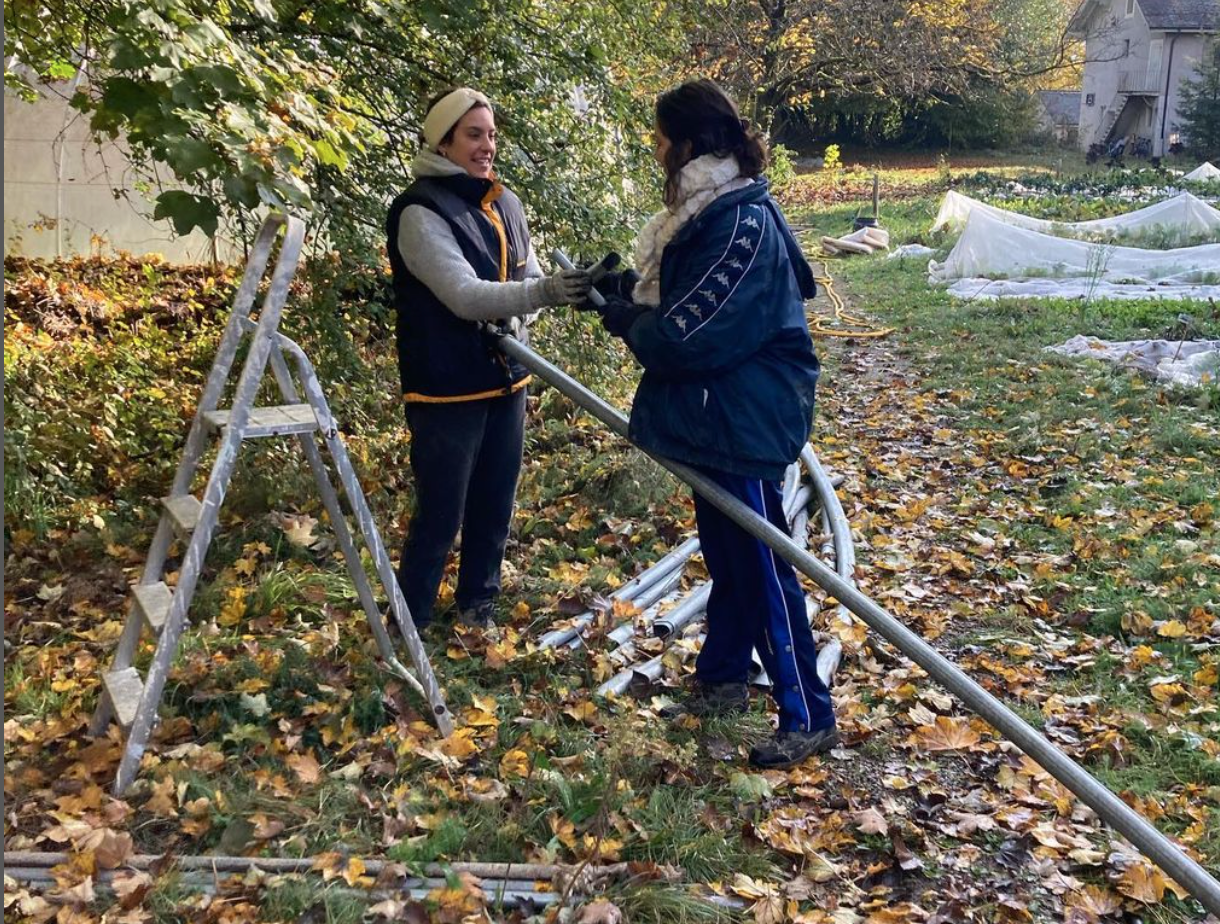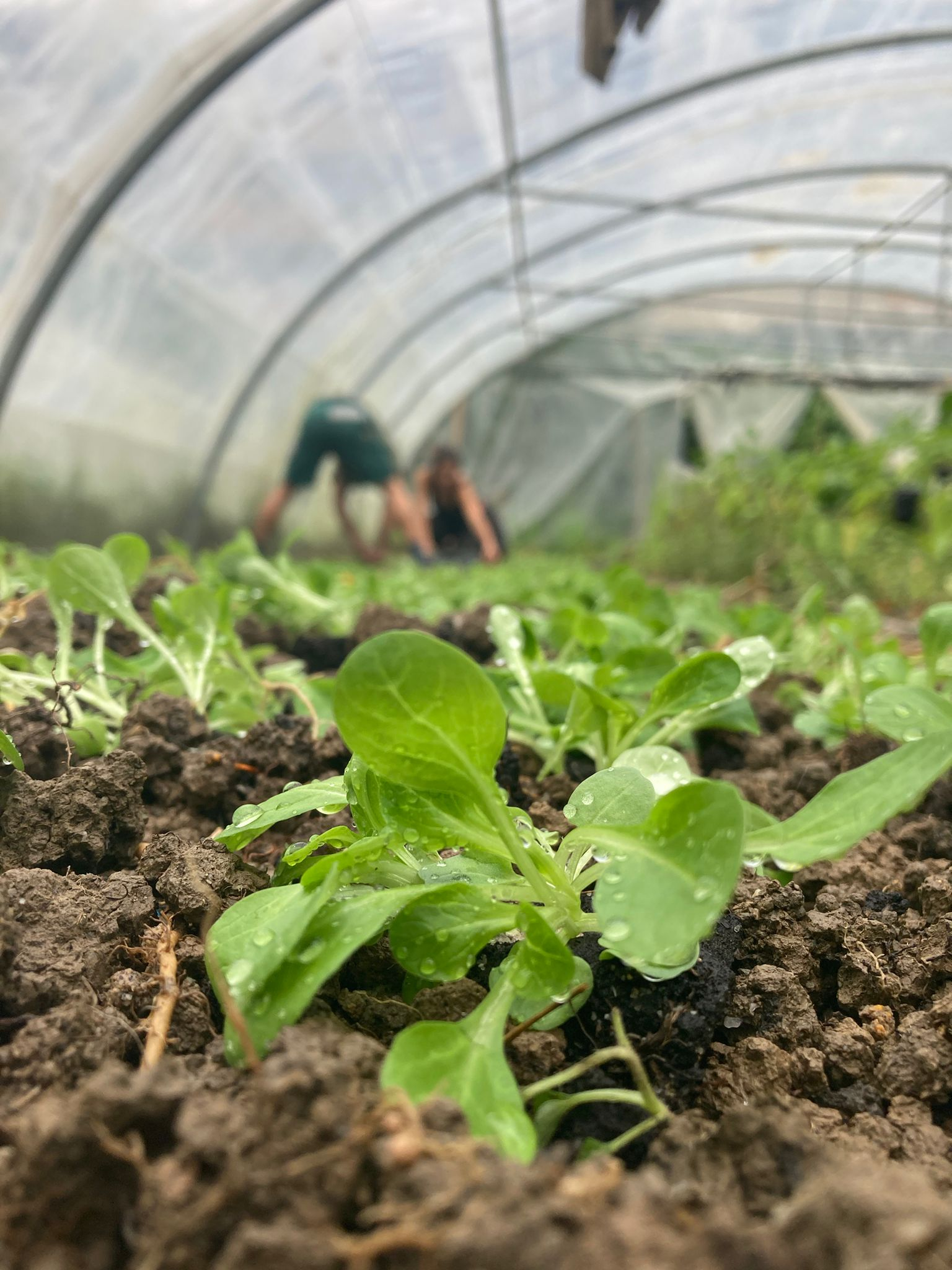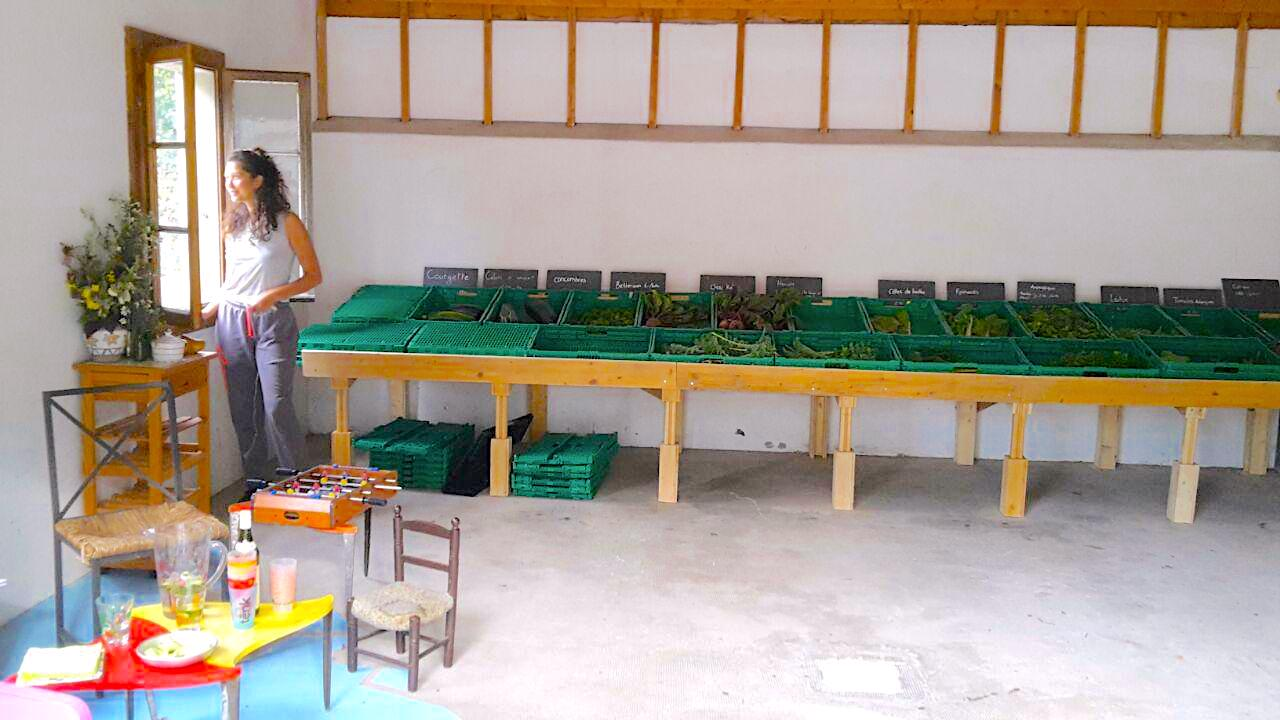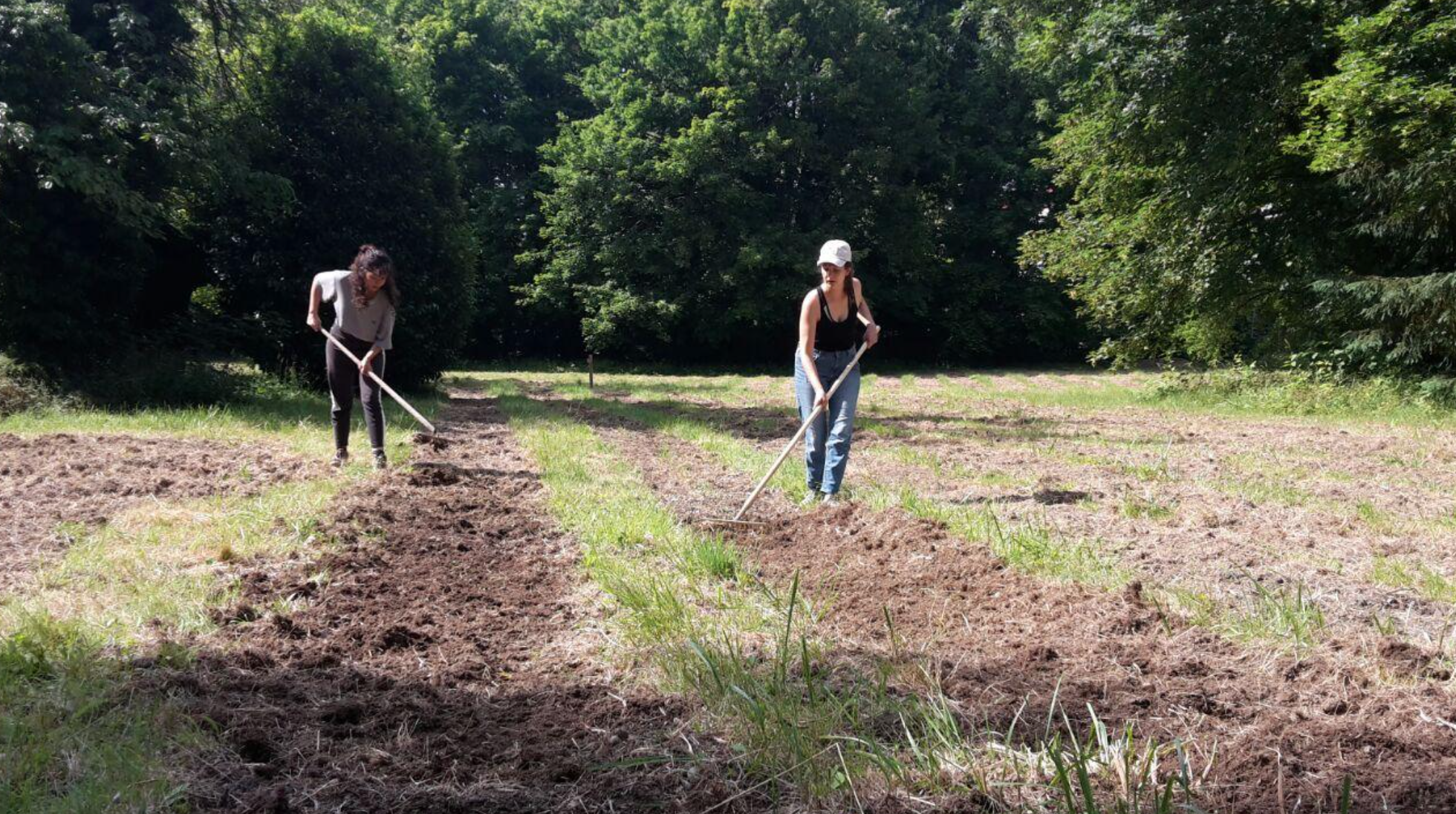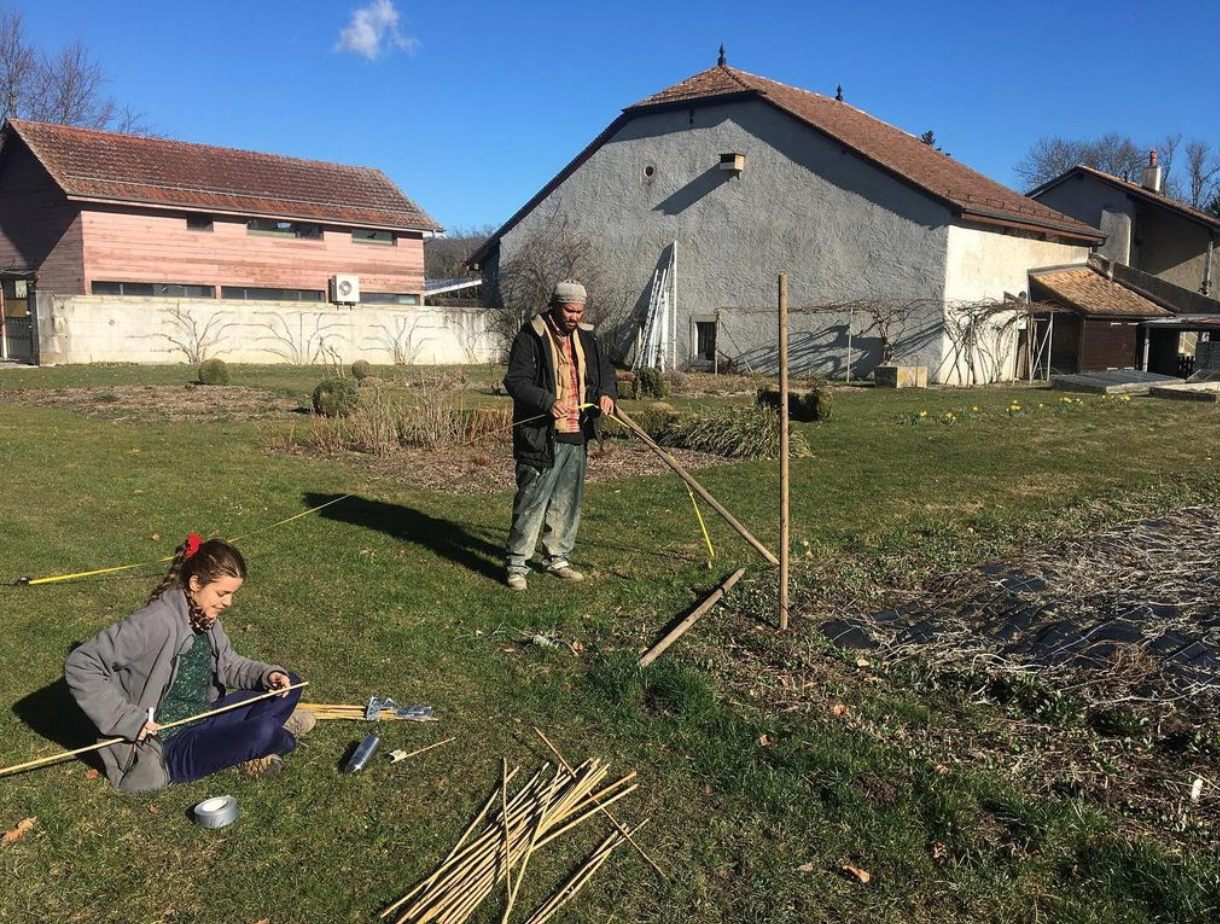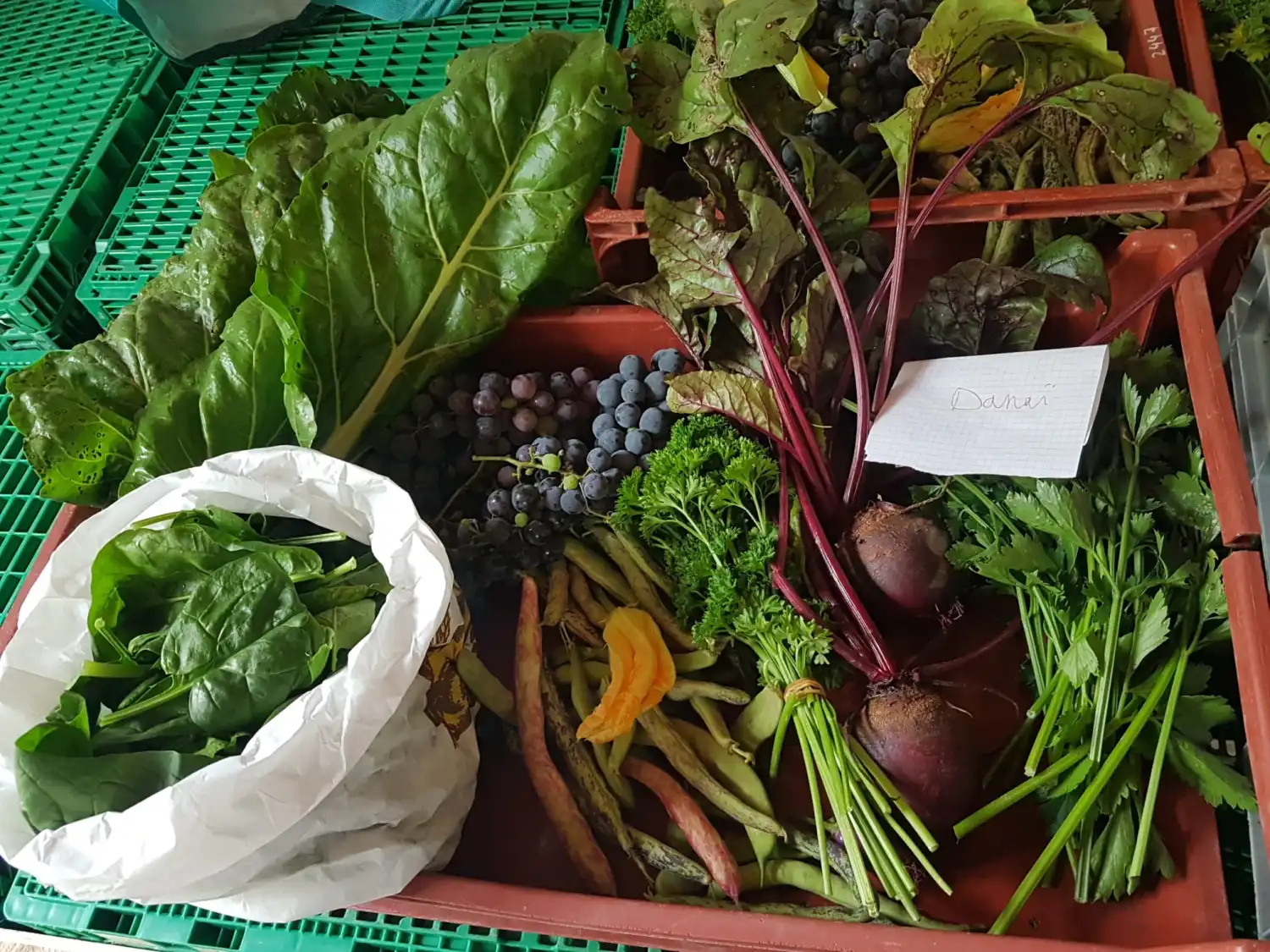Sapotage is an association made up of 4 young market-gardener friends – Christopher, Selma, Yasmine and Layla – who are committed to growing healthy, chemical-free vegetables in Versoix. In their search for a larger, more permanent site, the team faced a number of obstacles. We went to meet them to discuss the place of race and gender issues within the Swiss agricultural landscape.
Since 2020, “Sapotage” has been growing vegetables and selling them at a small self-service market and in contract baskets under the
Agriculture Contractuelle de Proximité
. The team advocates chemical-free peasant farming, which takes care of the soil and biodiversity, and offers affordable prices.
The association has cultivated a 3,000 m² plot of land at 105 Route de Suisse, which was loaned to them for 4 years but is due to be demolished to make way for new buildings. In addition to this space, the team occupies a 900 m² plot on the Ecogia estate, which they are looking to expand in order to meet the needs of their activities.
Coming from a variety of backgrounds (teaching, agronomy, horticulture or music), the team members don’t have the typical profile you’d expect in this field. Their journey is intimately political, and shows that the Swiss farming world still needs to evolve.
Two of our members, Selma Louichi (28) and Christopher Lopes (35), share their experiences with us.
Before we get started, since we’re going to be talking politics, I’d like to follow the format of the introduction to the podcast ”
Kiffe ta race
” podcast, and ask you if and how you situate yourself in terms of gender and race.
Christopher: I’m a cisgender, heterosexual, light-skinned black man.
Selma: I’m a white, heterosexual woman with Tunisian origins.
How did you get involved in the “Sapotage” adventure?
Selma: What motivated me was to create a project with friends, people I really like, and to do something that made sense. We thought, why not have our own project? We finally responded to a call for projects and it worked. I’m a primary school teacher and I’d already done some gardening but never farming. Getting started is always a bit tricky, but here we are.
Christopher : I am in the field of agriculture following a professional reorientation that began in 2019. Before that, I was also in the world of education and teaching. I wasn’t involved in designing the project, but I joined the association in April 2021. I arrived through Layla (editor’s note: one of the founding members of Sapotage). I started out as a volunteer, got on well with them and they asked me to join the team, which I readily accepted. I also work at the Jardins de Cocagne.
How do you differ from the typical Swiss farmer?
Christopher : First of all, we don’t have that parent-child relationship. In this business, we often hear about generations of farmers, which also means that you have easy access to land and work – and sometimes you don’t even have a choice. Secondly, I’m not white, and that makes people look at me differently – and not just in agriculture, and not just in Switzerland. My African origin means that I don’t fit into the cliché of the Swiss farmer. What’s more, growing up in an urban environment has a detrimental effect on the way I dress and speak. My difference is therefore mainly based on my family and ethnic origins.
Selma: First of all, we say a Swiss farmer, not a woman farmer, because we’re less likely to visualize a woman or another gender in that role. I come from the city, so I also grew up in an urban environment. I didn’t come from an agricultural background either, so it’s sometimes hard to feel legitimate. I also have another job because it’s not possible for us to make a living from it at the moment, even though we’ve been giving a lot of our time for the past two years. Having Tunisian origins also sets me apart. It’s true that it’s often passed down from generation to generation. In my family, in Switzerland, there’s nobody working in this field.
Christopher : For me, it was important to know that the association is made up of Selma, Yasmine and Layla. It was easier to integrate this team than if the members were Stéphanie, Camille and Céline.
You’re currently looking to extend the plot of land you occupy at the Domaine d’Ecogia in Versoix, but you’re encountering a few difficulties in the process.
Selma: At the moment, we don’t have enough space for what we want to produce. It’s a real headache, you have to think about what to do for each crop – if you’re behind on one, it means everything else is behind too. We expressed our desire to set up permanently during a meeting with Versoix farmers last year. Several hectares of land were to be distributed, and we were offered a plot whose configuration unfortunately didn’t correspond to our market-gardening project. There are also complicated lease issues. In the end, we didn’t get any of the spaces presented. Over a month ago, we proposed a meeting with the commune and the various players occupying the estate, which has not yet taken place. We feel we’re being taken for a ride. We’re told to look there or here, but we haven’t received any real support yet. The estate is a beautiful space that would be ideal for a market gardening project, for raising awareness with children, etc. So we’re still waiting to see what happens.
Christopher: I have the impression that we were politically recuperated at the beginning. We counted a lot on the town hall, which was there for us in the beginning, but now we feel abandoned. We don’t get any political help. The fact that our team is made up of three women and one black man also has an impact. I obviously don’t want to victimize our conditions, but I don’t minimize this impact either, especially in a milieu where the link to the land is very strong and is often linked to the hard right.
Selma: Maybe we should fight more. We want to get this meeting and be firmer, because we’re also fed up with being too conciliatory.
Why do you think it’s so difficult to get a larger plot?
Selma: That’s a good question, and one I’m asking myself too. A project like ours is the future, we know that, because ecologically it’s not going well at all. We’re more aware of food issues, but at the same time, things don’t move when projects like ours are taking shape. It’s such a difficult job, you give so much of yourself, and you still have to fight for the basics: the land. It’s annoying because we have the project, the motivation and the resources. We give so much of ourselves and get no recognition. We’re really not asking for much – we only need one or one-and-a-half hectares of land.
Christopher : I think it comes down to two things. First, there’s seniority. “Sapotage is a young association, and in contrast there are players who have been around forever. The other aspect is financial. We don’t necessarily have a lot of money, so it’s complicated for us to be able to work a plot right away without leaving it fallow, for example. They offered us land that had been chemically treated, so it would have taken a few years before we could grow crops on it, given that we farm organically. Financially, it wouldn’t have been possible.
So what’s the next step?
Selma: We’re still waiting for a reply to our request for a meeting. In the meantime, we are in a situation of insecurity. We’ll explain our position, and if they don’t agree, we’ll have no choice but to look elsewhere. There are other places where there is land. We’re not going to give up, otherwise the project will die.
Christopher: That’s where we start getting into political battles.
Selma: We’ll find a solution.
Christopher: There are also organizations like MAPC or uniterre who can give us support.
We mentioned at the outset that you have a profile that stands out from the traditional agricultural profile. Do you think this came into play at some point?
Christopher : I’m still convinced that there’s a connection. It’s always in the back of my mind, in every aspect of my life, and it puts me in a state of hypervigilance. You may experience it differently, Selma.
Selma: I don’t know if the fact that we’re women or racialized people factors into our access to land – maybe I’m not aware of it, or maybe I just don’t want it to. But I’ve certainly felt that connection in the way we’re spoken to at times. Some people are surprised that our team is made up of three women, and when we mention Christopher they say, “Oh, so there’s a man!
Christopher : I’ve also heard some not-so-interesting, not-so-intelligent phrases, which are often linked to my origins. For example, I was wearing a shirt and someone said to me: “It’s the Compagnie Créole!” or “Look, they’ve hired migrants”, thinking I wasn’t going to understand.
I wanted to talk about the question of appearance. In his study on queer people on farms in SwitzerlandPrisca Pfammatter wonders about the clothes she wears in the field. Have you ever asked yourself this question in relation to your workplace?
Christopher : Yes, I asked myself that a lot at first. I thought I was going to be judged on my clothes and that I had to fit into a particular style, that I had to wear hiking boots, pants with lots of pockets or overalls (laughter). At the Jardins de Cocagne where I work, there’s also a fairly horizontal structure with people involved in the fight against oppression. “Sapotage” joins them on all lines it’s really a place safe. I quickly realized that I didn’t need to change the way I dressed.
Selma: My experience with agriculture can be summed up as “Sapotage”, and at “Sapotage”, who cares? We don’t wear conventional farmer’s clothes.
How can agriculture become more inclusive?
Christopher : We need more micro-farms, more small farms. Access to land should be made easier for people setting up projects. All this also involves educating the very young. We offer to host classes in the field, as it’s important for them to see the work we do. I had some teenagers over not long ago who were surprised to see me in this role – they were expecting to see the cliché of the Swiss peasant.
Selma: It’s political. We need to rethink the way we look at people who farm, and open up to different forms of farming to make it work. We need more visibility and, indeed, more awareness-raising through visits and the like. Classes come without prejudice and realize that it’s a very varied job. We also need real support from the government.
You are promoting sustainable, local farming, which contributes to the life of the soil and its biodiversity. By 2020, only 15% of farms in Switzerland had an organic label. How is this approach perceived today?
Christopher : We’re sometimes told that we’re wasting our time, that if we used this or that product it would be easier. We’re very keen on hand weeding, removing bugs from plants and so on. It’s a bit like an old-fashioned, hippy job.
Selma: And at the same time, all our subscribers are super happy to eat our vegetables and tell us they’re incredible. So you really notice the difference, which is great! Around us, I think there’s a fair amount of awareness, we see organic as a good thing, but that doesn’t necessarily mean it’s translated into practices and habits.
There is sometimes a bucolic vision of organic farming…
Selma: That’s right. For example, we use tarpaulins, and this upsets some people who criticize us for using plastic. But if we don’t, we’ll spend our time weeding. There are always people coming up to us to tell us what we could do better when they don’t know anything about it.
Christopher : In particular, we use a tarpaulin on our squash crops to prevent weeds from growing around them and taking all the nutrients. It’s impossible to weed because they’re creeping plants. This fabric is also used for blackout. When tarpaulins are laid over bare soil, weeds don’t grow and crops can be prepared without weeding.
Selma: It also keeps the soil out of direct sunlight and moisture. I understand that people with small gardens don’t need such a structure. But when you plant 300 squashes, yes, you’re going to do that. We don’t use pesticides, so our approach means that we are somewhat obliged to use a tarpaulin. People have this romantic view of organic farming without really having done it. Looking after a small vegetable garden is nothing like what we do.
Syngenta boss Erik Frywald recently made a statement
a statement
which caused quite a stir. To sum up, he said that organic farming harms the climate and favors the use of larger areas for lower yields. He then added: “The indirect consequence is that people are starving in Africa, because we are eating more and more organic produce.” As a reminder, Syngenta is an agrochemical giant that manufactures genetically modified fertilizers and seeds. How do you react to this statement?
Selma: We can’t take these remarks seriously. In our approach to market gardening, we don’t need a lot of land to produce vegetables. What’s more, we practice semi-intensive cultivation, so every time we remove, we put back.
Christopher : That’s a bold thing to say, especially for someone like him. It’s a communication strategy because Syngenta, like Monsanto, has a bad reputation. He should also leave Africans alone.
